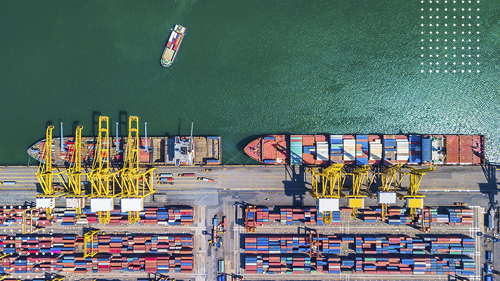How IMO 2020 Could Impact Mega-Ships, Carriers and Ocean Freight Rates
10/16/2019

In case you missed it, the International Maritime Organization (IMO) is implementing a new sulfur emission rule in 2020. This is expected to directly impact fuel, but it could have much further impacts across the shipping industry. With just over two months until implementation, our team is here to help supply chain managers plan for the impending changes approaching with the New Year.
In This Article
- IMO 2020 Defined
- Impact on Mega-Ships and Carriers
- Impact on Ocean Carrier Rates
What is IMO 2020?
Effective January 1, 2020, the IMO will enforce sulfur emission limits in international waters to help improve global air quality. International marine transport is responsible for approximately five percent of global oil demand. While that is a relatively small percentage, the impact should still be accounted for in 2020 planning for supply chain executives.
Impact on Mega-Ships and Carriers
Growth in international trade has prompted more ocean carriers to build and deploy mega-ships. These ships expand individual vessel capacities up to 20,000 TEUs (learn more about TEUs in our Import 101 eBook).
There are many benefits to utilizing mega-ships. Some include:
- Consolidation of trade cargo, resulting in lower crew cost and economies of scale
- Fuel consumption is approximately half per container moved compared to older, smaller ships
When utilizing space on mega-ships, there are also disadvantages. Those include:
- Less flexibility in emergency situations
- Port congestion
- Longer port calls and extended estimated times of arrival
So, how will the IMO 2020 impact mega-ships and carriers?
Under the new sulfur emission restrictions, ships will have to use fuel with a sulfur content of 0.5 percent m/m (mass by mass), a large decrease from the current limit of 3.5 percent. While mega-ships are more efficient, they will naturally use more fuel which could impact the supply of lower sulfur fuel. Alternatively, if carriers do not want to use the low-sulfur fuel, they will have to endure the cost of installing scrubbers to continue burning the current heavy bunker fuel. Compliance with the sulfur law is estimated to increase the port-to-port move cost by 10 to 20 percent, which will likely be paid by the buyer – not the carrier.
Impact to Ocean Freight Rates
There are many variables to consider when estimating and planning for ocean freight rates. Next year will be no different.
Combining the ongoing tariffs fluidity and the new sulfur fuel restrictions, importers and exporters could be questioning the reliability of their 2020 budgets. The new sulfur law is proposed to cost the industry approximately $50 billion in 2020. This, coupled with the recent industry increases in bunker surcharges and the expected shortage of compliant fuel, has made the future of freight rates difficult to predict.
Our Trade Management team continues to monitor the conditions driving changes in today’s market. Normal fluctuations that occur in carrier pricing can be managed through a hybrid approach and a mix of contract and spot rates. However, conditions brought on by mandated regulatory efforts, such as IMO 2020, can create pricing and space challenges that everyone in the market will need to manage through. It will take some time for the market to fully adjust, so shippers should prepare for pricing fluctuations. Our key to success is communicating with transparency and doing everything we can to mitigate increases on behalf of our clients.
– Bruce Chilton, Vice President of Trade Management
While predicting the full impact on ocean freight rates in 2020 is impossible, developing contingency plans with your supply chain partner is imperative. Communicating early and often with C-Suite will be important for supply chain management, as it is almost guaranteed that rates will increase in the first six months of 2020.
Mega-ships and changing regulations will continue to impact the international transportation industry and Ascent Global Logistics is here to help you navigate the complexities.
Contact us today to learn more about how we can help you with International Trade and Freight Forwarding.